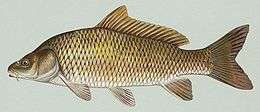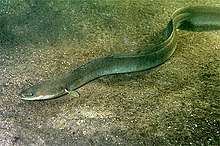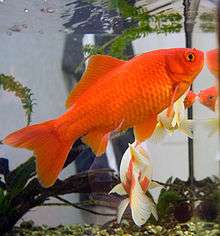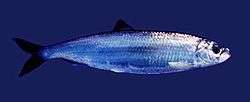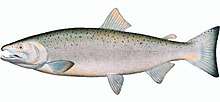fish
English
| Picture dictionary | |||||||||||
|---|---|---|---|---|---|---|---|---|---|---|---|
|
| |||||||||||
|
Pronunciation
- IPA(key): /ˈfɪʃ/
- (General New Zealand) IPA(key): /ˈfɘʃ/
Audio (RP) (file) Audio (GA) (file) Audio (AU) (file) - Rhymes: -ɪʃ
- Homophone: ghoti
Etymology 1
From Middle English fisch, from Old English fisċ (“fish”), from Proto-Germanic *fiskaz (“fish”) (compare West Frisian fisk, Dutch vis, Danish fisk, Norwegian fisk, German Fisch), from Proto-Indo-European *peysḱ- (“fish”) (compare Irish iasc, Latin piscis).
Noun
fish (countable and uncountable, plural fish or fishes)
- (countable) A cold-blooded vertebrate animal that lives in water, moving with the help of fins and breathing with gills.
- Salmon is a fish.
- The Sun Mother created all the fishes of the world.
- The Sun Mother created all the fish of the world.
- We have many fish in our aquarium.
- (archaic or loosely) Any animal (or any vertebrate) that lives exclusively in water.
- 1774, Oliver Goldsmith, History of the Earth and Animated Nature, volume IV:
- The whale, the limpet, the tortoise and the oyster… as men have been willing to give them all the name of fishes, it is wisest for us to conform.
- 1851, Herman Melville, Moby-Dick:
- Be it known that, waiving all argument, I take the good old fashioned ground that the whale is a fish, and call upon holy Jonah to back me.
-
- (uncountable) The flesh of the fish used as food.
- 2012 March, “Flexing your brain”, in Consumer Reports on Health, volume 24, number 3, page 9:
- Include low-mercury fish in your diet (such as salmon) and eat at least five servings a day of fruit and vegetables, especially dark leafy greens, broccoli, and cauliflower. Avoid saturated and trans fats, which may hasten brain aging.
- The seafood pasta had lots of fish but not enough pasta.
-
- (uncountable) A card game in which the object is to obtain cards in pairs or sets of four (depending on the variation), by asking the other players for cards of a particular rank.
- (uncountable, derogatory, slang) A woman.
- (countable, slang) An easy victim for swindling.
- (countable, poker slang) A bad poker player. Compare shark (a good poker player).
- (countable, nautical) A makeshift overlapping longitudinal brace, originally shaped roughly like a fish, used to temporarily repair or extend a spar or mast of a ship.
- (nautical) A purchase used to fish the anchor.
- (countable, nautical) A torpedo.
- 1977, Richard O'Kane, Clear the Bridge: The War Patrols of the U.S.S. Tang, Ballantine Books (2003), page 344:
- The second and third fish went to the middle of her long superstructure and under her forward deck.
- 1977, Richard O'Kane, Clear the Bridge: The War Patrols of the U.S.S. Tang, Ballantine Books (2003), page 344:
- (zoology) A paraphyletic grouping of the following extant taxonomic groups:
- Class Myxini, the hagfish (no vertebra)
- Class Petromyzontida, the lampreys (no jaw)
- Within infraphylum Gnathostomata (jawed vertebrates (also including Tetrapoda)
- Class Chondrichthyes, cartilaginous fish such as sharks and rays
- Superclass Osteichthyes, bony fish.
- (cartomancy) The thirty-fourth Lenormand card.
Usage notes
The collective plural of fish is normally fish in the UK, except in archaic texts where fishes may be encountered; in the US, fishes is encountered as well, but much less commonly. When referring to two or more kinds of fish, the plural is fishes.
Hyponyms
- (aquatic cold-blooded vertabrae with gills): Cephalaspidomorphi, Chondrichthyes, Osteichthyes
- (food): seafood
Derived terms
- big fish in a small pond
- bony fish
- cold fish
- dragonfish
- drink like a fish
- fish and chips
- fish bowl/fishbowl
- fishbrain
- fishcake
- fish-eating grin
- fisher
- fisherman
- fish feed
- fish finger
- fish food
- fishful
- fishgig
- fish hook/fishhook
- fishkill
- fishkind
- fish ladder
- fishless
- fishlike
- fishling
- fishly
- fishmeal
- fishmonger
- fishmoth
- fish out of water
- fish paste/fishpaste
- fish pond/fishpond
- fishpound
- fishpox
- fishroom
- fish sauce
- fishskin
- fishskin disease
- fish slice
- fish supper
- fishtail
- fish tank/fishtank
- fish tape
- fishway
- fishwife
- fishwoman
- fishworm
- fishy
- give a man a fish and you feed him for a day; teach a man to fish and you feed him for a lifetime
- goatfish
- goldfish
- have other fish to fry
- jellyfish
- like shooting fish in a barrel
- lumpfish
- neither fish nor fowl
- overfish
- queer fish
- sailfish
- shellfish
- silverfish
- starfish
- surgeonfish
- swim like a fish
- there's plenty more fish in the sea
- tuna fish
- unfishiness
- unfishy
Related terms
- (adj): fishly, piscine, fishy (inf.)
- (astronomical): The Fish, Pisces
- (collective): piscifauna
- (combinatorial form): pisci- (Latinate, general)
- (fish-catcher): See fisher
- (fish-eater): piscivore
- (fish-infesting): piscolous
- (fish-killing): piscicidal
- (fish-like): fishly, piscose (culinary), fishy, fishlike (inf.)
- (fish science): fishlore, piscatology (irreg.)
- (fish-shaped): pisciform
- (fish vendor): fishmonger, piscitarian
- (full of fish): fishful, pisculent
- (skin disorder): fish-skin disease
- (state of being a fish): fishdom, fishhood (formal), piscinity (formal), fishiness (inf.)
Translations
|
|
|
|
|
See also
- Appendix:Fish
Etymology 2
Deverbal from to fish (etymology 3).
Noun
fish (plural fishes)
- A period of time spent fishing.
- The fish at the lake didn't prove successful.
- An instance of seeking something.
- Merely two fishes for information told the whole story.
Etymology 3
From Old English fiscian, from Proto-Germanic *fiskōną.
Verb
fish (third-person singular simple present fishes, present participle fishing, simple past and past participle fished)
- (intransitive) To hunt fish or other aquatic animals.
- 19th c., anonymous, "The Bonny Ship the 'Diamond'"
- It's cheer up, my lads, let your hearts never fail,
- For the bonny ship the Diamond goes a-fishing for the whale.
- She went to the river to fish for trout.
- 19th c., anonymous, "The Bonny Ship the 'Diamond'"
- (transitive) To search (a body of water) for something other than fish.
- They fished the surrounding lakes for the dead body.
- (intransitive) To (attempt to) find or get hold of an object by searching among other objects.
- Why are you fishing through my things?
- He was fishing for the keys in his pocket.
- (intransitive, followed by "for" or "around for") To talk to people in an attempt to get them to say something.
- The detective visited the local pubs fishing around for more information.
- The actors loitered at the door, fishing for compliments.
- (intransitive, cricket) Of a batsman, to attempt to hit a ball outside off stump and miss it.
- (nautical) To repair a spar or mast by fastening a beam or other long object (often called a fish) over the damaged part (see Noun above).
- 1970, James Henderson, The Frigates, an account of the lesser warships of the wars from 1793 to 1815, Wordsworth (1998), page 143:
- […] the crew were set to replacing and splicing the rigging and fishing the spars.
- 1970, James Henderson, The Frigates, an account of the lesser warships of the wars from 1793 to 1815, Wordsworth (1998), page 143:
Synonyms
Translations
|
|
|
References
- fish in Webster’s Revised Unabridged Dictionary, G. & C. Merriam, 1913.
Further reading




.jpg)

